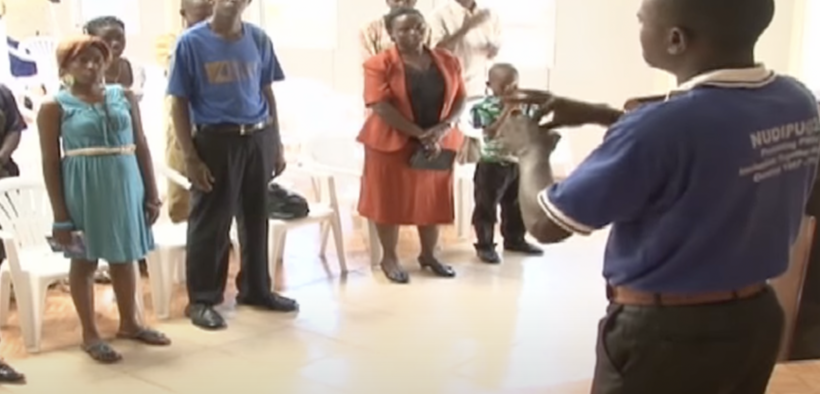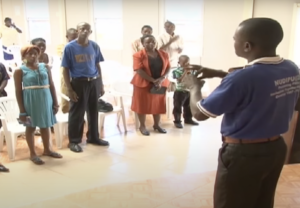Reaching Out to Africa’s Deaf
What churches are doing to better communicate

Ever since Juliet Ndlovu discovered that her daughter Nozipo was deaf just over a decade ago, she has taken her from one church to another.

Initially, she did so in search of miracle healing, but later — as she reconciled herself to the reality that her daughter could be deaf for life — her concern turned to Nozipo’s spiritual well-being.
“Nozipo’s spiritual life is something that has worried me a lot,” said Ndlovu, 38, when talking about her 14-year-old daughter. “Although I have been to many churches with her, I really can’t say it has been beneficial to her in any way because none of these churches have sign language interpreters, let alone sign language pastors … most of the things she knows (about Jesus Christ) are from her school and what she learns online.”
Because of this, when Ndlovu heard about the Rev. Mary Chipoka-Zenda, Zimbabwe’s first deaf pastor, she was elated.
“It’s not just about my daughter but about the hundreds of thousands of others like her, who have been deprived of an opportunity to make conscious choices of their own,” Ndlovu said.
Nozipo is but one of the nearly 300,000 deaf people in Zimbabwe who have largely been excluded from receiving the Gospel because worship in local churches is conducted in spoken language to the exclusion of the deaf. The southern African nation has about 1.5 million people who suffer various degrees of hearing problems, and of these, about 300,000 are fully deaf. With only 73,000 of them having access to passable sign language, most members of this community have been condemned to a forlorn existence in conditions of both physical and social isolation.
The deaf finally remembered
This, however, is set to change as churches in Zimbabwe have started taking steps to embrace this unreached community that has existed on the margins for a very long time. One after another, some mainline churches in the country have started accommodating the deaf during services, starting to deploy sign language interpreters to translate sermons.
Others, like the Hilltop United Methodist Church in the eastern city of Mutare, have brought together more than 60 deaf people and as many as 15 professional sign language interpreters. The Reformed Church in Zimbabwe in the city of Masvingo, which runs the oldest school of the deaf, is where Chipoka-Zenda, who was trained in South Africa, ministers.
Access to MinistryWatch content is free. However, we hope you will support our work with your prayers and financial gifts. To make a donation, click here.
The Rev. Wilfred Dimingu, the general secretary of the Zimbabwe Council of Churches, told Religion Unplugged the council is on the cusp of establishing the country’s first deaf church where everything will be done almost exclusively in sign language.
“Until now, some churches have been having Sign Language interpreters to cater for the deaf, but this has not been enough,” he said. “After engaging the deaf community, they made it clear that what they want is a church of their own. … They insist on it being called the Deaf Church, and we are working with the Bible Society to ensure that there is a sign language Bible and other literature because everything will have to be in sign language.”
The Zimbabwe Council of Churches is implementing recommendations of the World Council of Churches’ Ecumenical Disability Advocates Network, which calls for churches to embrace people with disabilities and facilitate their leadership. The move further stems from the ZCC’s Zimbabwe Disability Inclusion Survey, an accessibility assessment survey carried out in 2021 to determine the accessibility of churches to those living with disabilities.
Dimingu said this church for the deaf is set to be open before the end of this year.
“We will start with one Deaf Church in Harare, then we will ask where the community wants the next church to be,” he said.
In a statement posted on its websites, the Zimbabwe Bible Society, added, “The purpose of this Sign Language Bible project is to bring the Word of God to the Deaf Community in Zimbabwe in the language they understand so that they understand the Word of God using their preferred language.”
Little done to accommodate
Kimion Tagwirei, a theological academic at South Africa’s North-West University, said that while the deaf have largely been ignored in most churches, some Christian denominations started making initiatives to accommodate this community some years ago.
“Some denominations like RCZ (Reformed Church in Zimbabwe) and Anglicans have established ministries that serve and empower the deaf to minister to each other holistically, beyond mere proclamation to demonstration of the gospel,” Tagwirei said. “However, the majority of churches, as well as ecumenical bodies like EFZ (Evangelical Fellowship of Zimbabwe) and ZCC have not done much to accommodate the deaf, mainly because of lacking cultural inclusivity.”
He listed reasons for this situation, such as a lack of capacity since most church leaders have not learned sign language; cultural gaps since the church has not studied the culture of the deaf; and a lack of inclusivity.
“My research on the deaf reveals that the deaf can only feel and be accommodated in the hearing church when some of the deaf are involved in the leadership and liturgy of the church,” Tagwirei said. “Excluding them is a statement to them that they are not taken as normal as others. The deaf do not want to be pitied. It’s not abnormal to be deaf! It’s just being different and using a different language. Thus, the same way the hearing church uses English, Shona and Ndebele for example, she should also use sign language in church to accommodate the deaf.”
Reaching out to 40 million people
The neglect of the deaf in a liturgical context is a continent-wide phenomenon. Most African churches are guilty of neglecting the continent’s 40 million deaf men, women and children as their services are conducted through spoken languages to the exclusion of this community.
According to the World Federation of the Deaf, there are more than 70 million deaf people worldwide. A World Health Organization 2021 report says about 40 million of these people are found in Africa. September was Deaf Awareness Month. Sept. 23 is set aside for International Days of Sign Languages. This year’s day was celebrated under the theme “A World Where Deaf People Everywhere Can Sign Anywhere!”
This year’s day came shortly after South Africa had upgraded sign language to be the country’s 12th official language. It became the fourth African nation to do so, following Kenya, Uganda and Zimbabwe.
In Kenya, where up to 2.7 million people are deaf, sign language is the East African country’s third official language, after English and Swahili. Efforts are being made to ensure that the deaf are accommodated in the church.
Ghana National Association of the Deaf executive director Juventus Duorinaah told Religion Unplugged that while sign language is widely available, only a small number of people use it.
“In recent years, religious bodies and private institutions have also developed interest in sign language and are teaching their congregations and students sign language,” Duorinaah said. “The government has also made considerable effort in promoting GhSL (Ghana Sign Language) by recognizing sign language interpreters in certain institutions and has mandated and (incorporated) sign language in the curriculum of some tertiary institutions as a compulsory course.”
This past June, the Botswana Bible Society embarked on an ambitious project that will see the country having its first sign language Bible by 2027.
South Africa has been the most progressive country in terms of giving an ear to the deaf, with 43 schools and one tertiary institution available to serve 4 million deaf people. They have trained more than 600,000 people to communicate using sign language.
Tagwirei said sign language is rarely used in preaching, and interpreters are not usually engaged in ecclesiastic communication. Most deaf people are born into hearing families who sometimes take them to church — but only 10% of families in Africa (23% in the United States) learn enough sign language to communicate effectively with loved ones.
“The church,” Tagwirei said, “should realize that if it cannot use sign language and expects deaf people to speak orally, the church itself is disabled and unable to communicate the gospel with deaf people.”
This article was originally published by Religion UnPlugged.
Main photo: Video screenshot



